
Table of Contents
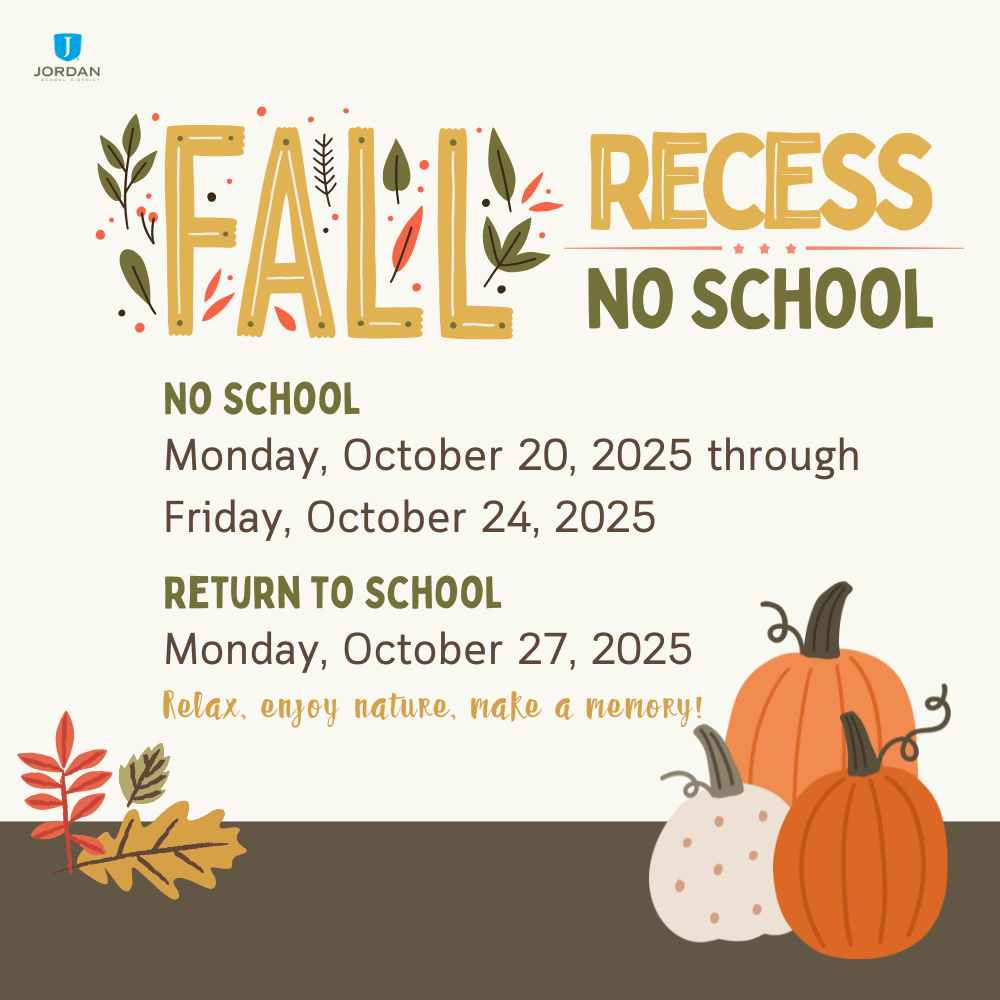

Get Answers to Frequently Asked Questions About Attendance
Why is attendance important every day?
Regular school attendance helps students in so many ways including forming routines, learning new subjects and skills, staying on track academically, and graduating on time. Attending daily also helps students form connections with teachers and their peers and with making friends, which are important parts of social-emotional development. In addition, the habit of good attendance will help your student(s) do well in their future workplace.
Is your student struggling to attend school regularly? How can we help? Click here or scan the QR code to fill out a help form. School & Family Partnership Form QR Code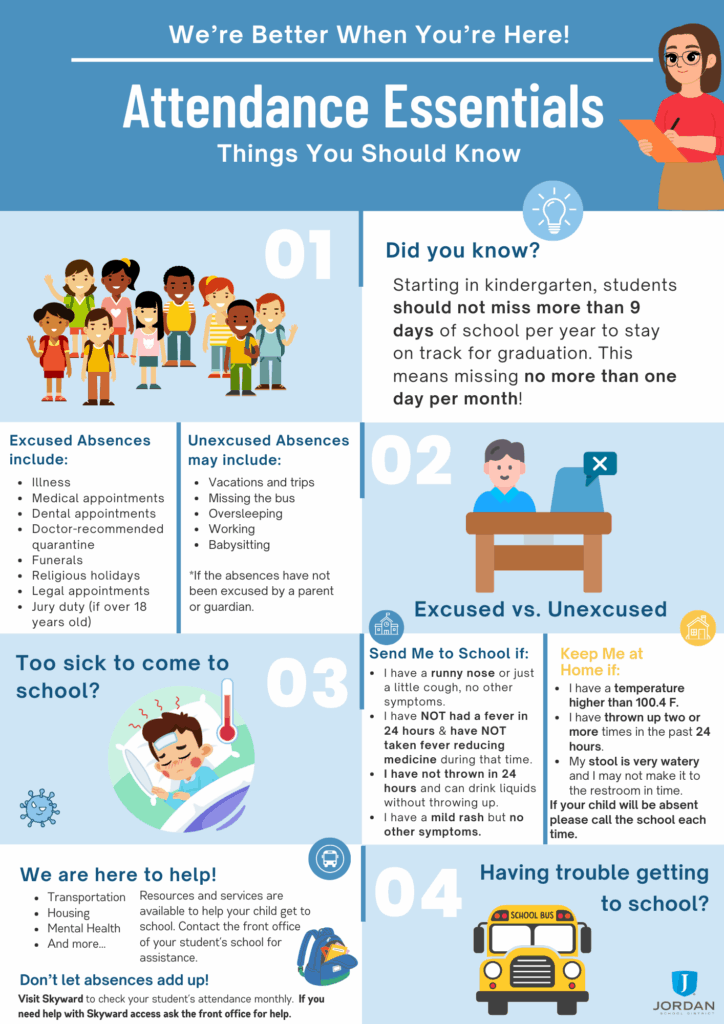
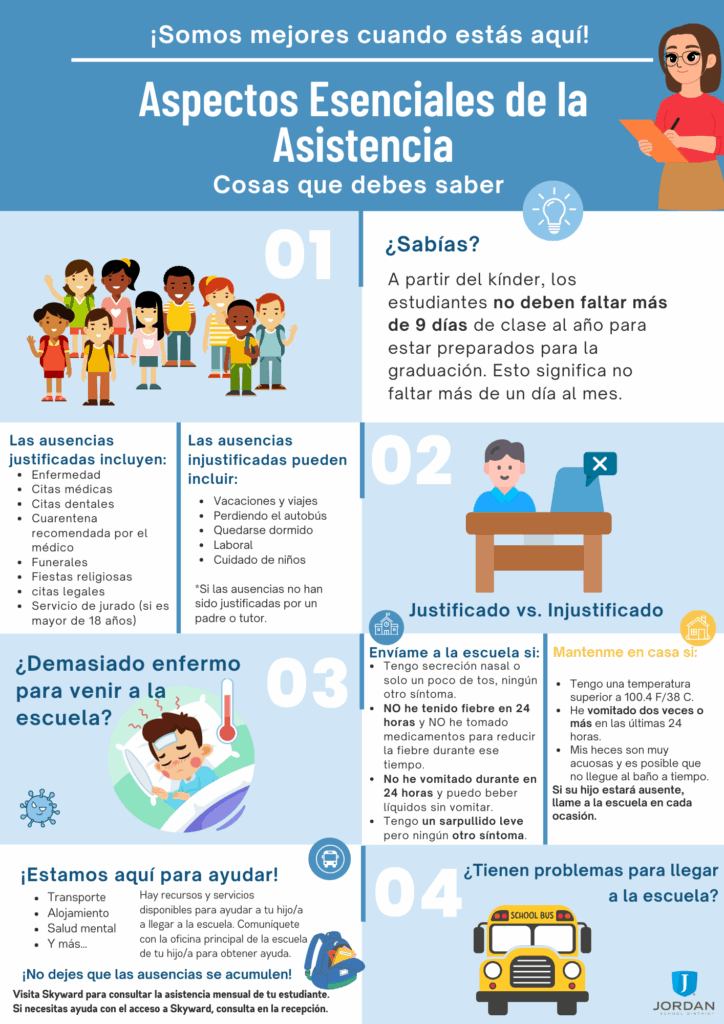

What is chronic absenteeism?
Chronic absence measures lost learning time. It has been defined as missing 10% or more of the total number of days enrolled in school per year for any reason– excused, unexcused, or out of school suspension. Being chronically absent impacts students negatively. Research shows these students tend to have difficulty reading on grade level by third grade, succeeding in middle school, and graduating from high school. Missing only two days a month can put a student at risk for being chronically absent.
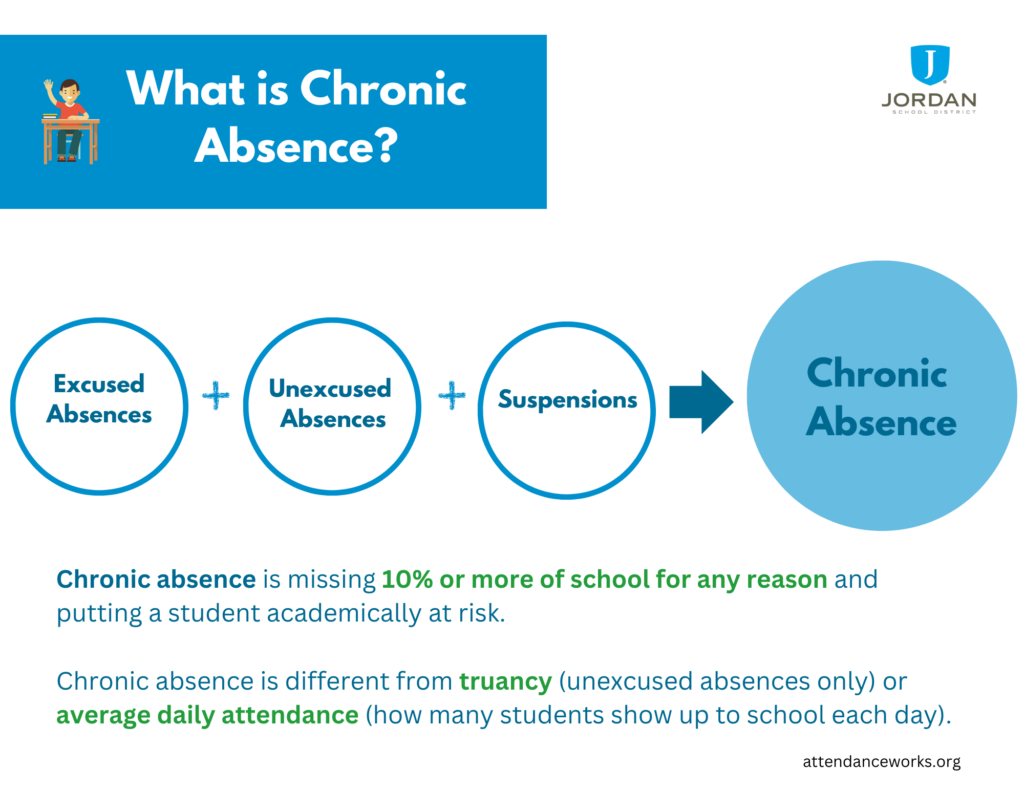
Why are students chronically absent?
Research has shown that there are 4 categories chronically absent students fall into.
- Misconceptions about school attendance that are not true-
- Pre-K and Kindergarten are not important for learning, in fact these are very important for later school success.
- Only unexcused absences are a problem.
- Missing a day here or there doesn’t affect my child’s learning.
- Attendance only matters in the upper grades.
- Students should miss school for any illness symptom.
- Barriers to attendance-
- Lack of access to basic needs services-transportation/housing.
- Chronic health condition or lack of health care/dental care.
- Caring for family members.
- Trauma.
- Disliking or avoiding school-
- Academic or social challenges.
- Unwelcoming school climate.
- Bullying or Teasing by others.
- Parents had a negative school experience.
- Disengagement from school-
- Lack of engaging or relevant instruction.
- No meaningful relationships with adults in the school.
- Failing to earn credits towards graduation.
- Lack of supports, academic, mental, or behavioral.
Resource-Instant Insight for Disengagement-2 minute video from a professional therapist
Is your student experiencing any of these barriers? Scan the QR code and give us more information so we can help you.
What benefits does my child receive from regular school attendance?
There are so many positive things to look forward to when students attend school daily. Being at school helps students achieve higher academically, build stronger relationships with their peers and teachers, and creates a sense of belonging. Attending school provides students with the opportunity to develop critical life skills such as teamwork, communication, problem solving and time management. They also benefit from structured routines, opportunities for physical activity, access to low cost meals, and access to mental health services.
Is good attendance in Kindergarten important?
Yes! Kindergarten is very important to your child’s future learning. In kindergarten your child will be learning important skills that will "set the course” for school success in the years to come. Research shows that Kindergarteners who are chronically absent perform at a lower level in reading, math and general knowledge. Kindergarten provides students with the building blocks necessary to read on grade level.
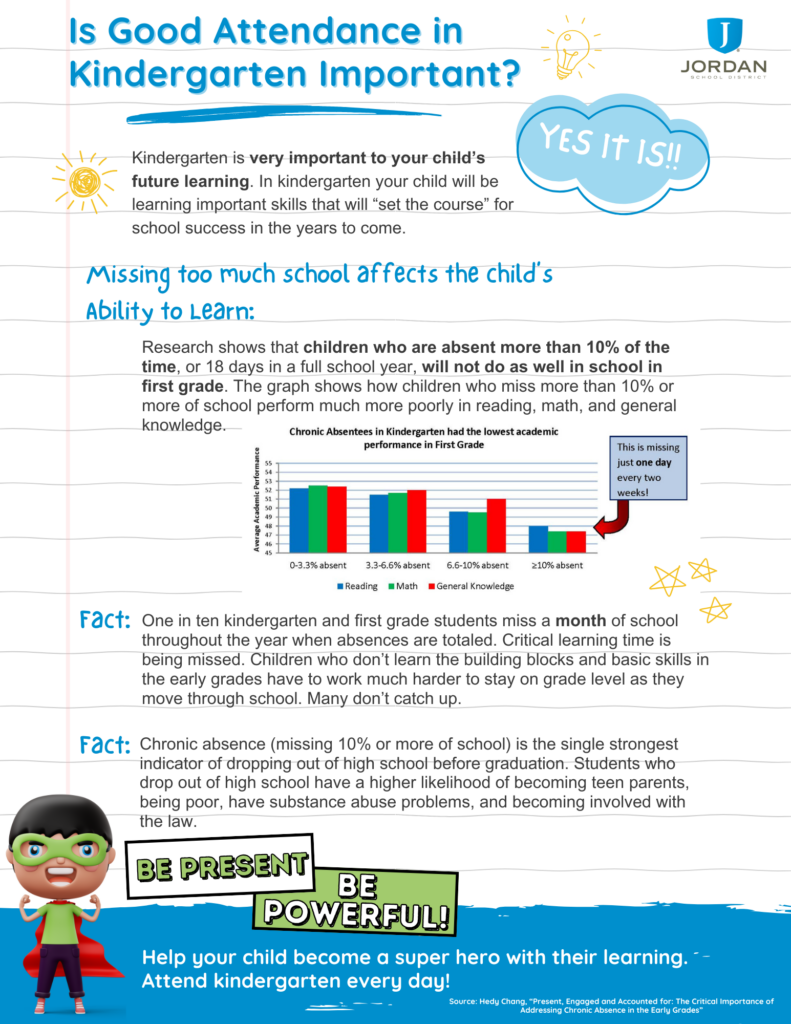
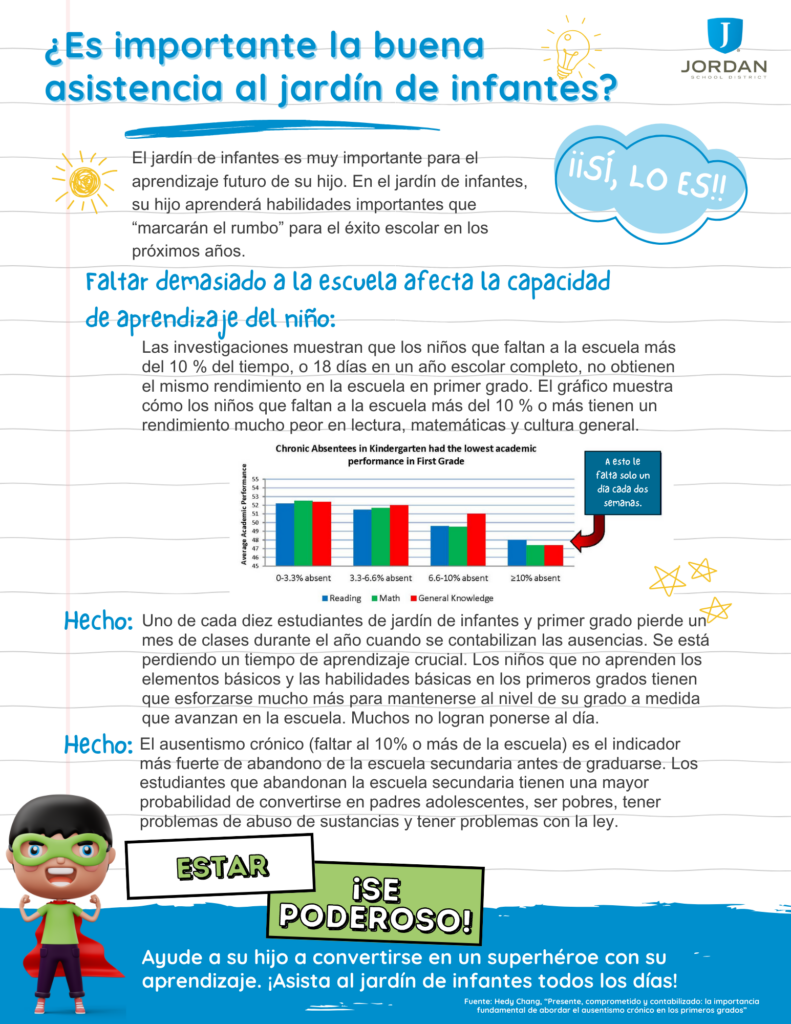
What should I do if my child has chronic health concerns?
Chronic health conditions can be regularly managed at school. Our schools are staffed with school nurses and support staff trained to deal with an assortment of illnesses and chronic conditions. Set up a time to speak with your school’s nurse about your child’s condition and form a plan for medication management, flare ups and other medical needs your child may have at school.
You may also find the following articles helpful.
- American Academy of Pediatrics (AAP) suggests 5 ways to help keep kids with special care needs healthy and in school.
- You can find many resources to guide you on healthychildren.org .
Resources for families struggling with asthma:
How do I know when I should keep my child home from school?
Children should be kept home if they have had a fever within the last 24 hours, diarrhea, or vomiting. Attendance Works, a national attendance alliance, in coordination with Pediatricians, have provided guidance on when it is okay to send your child to school. You can find guidance in English here or in Spanish here. If you are unsure whether or not to keep your child home due to another sickness not listed, you can always contact the school nurse first thing in the morning to help you determine if they should come to school.
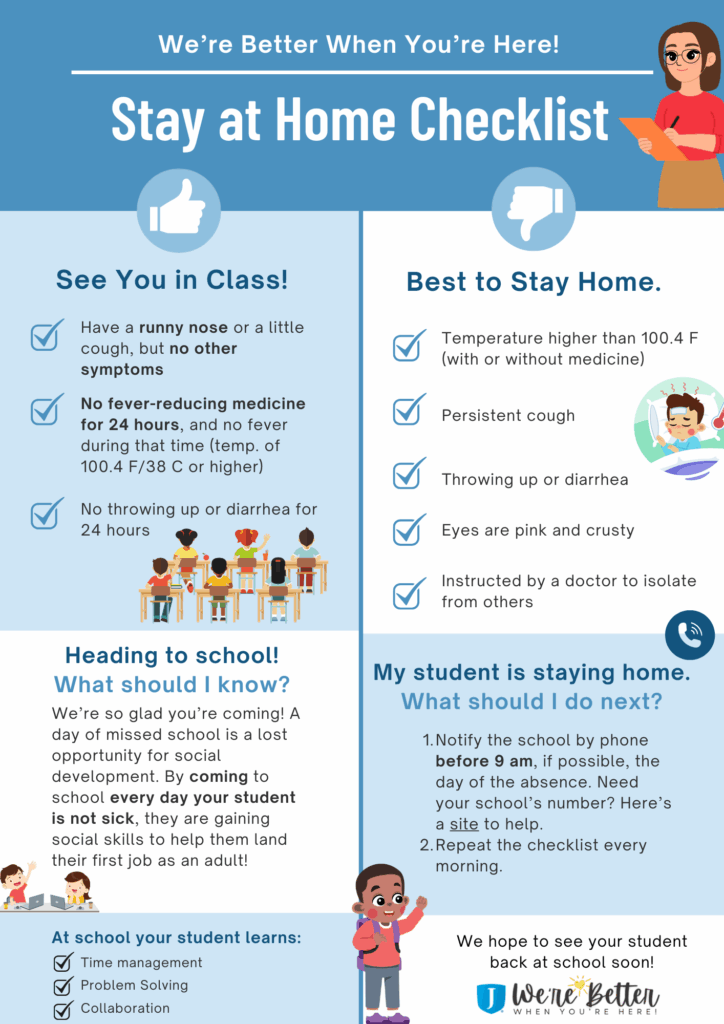
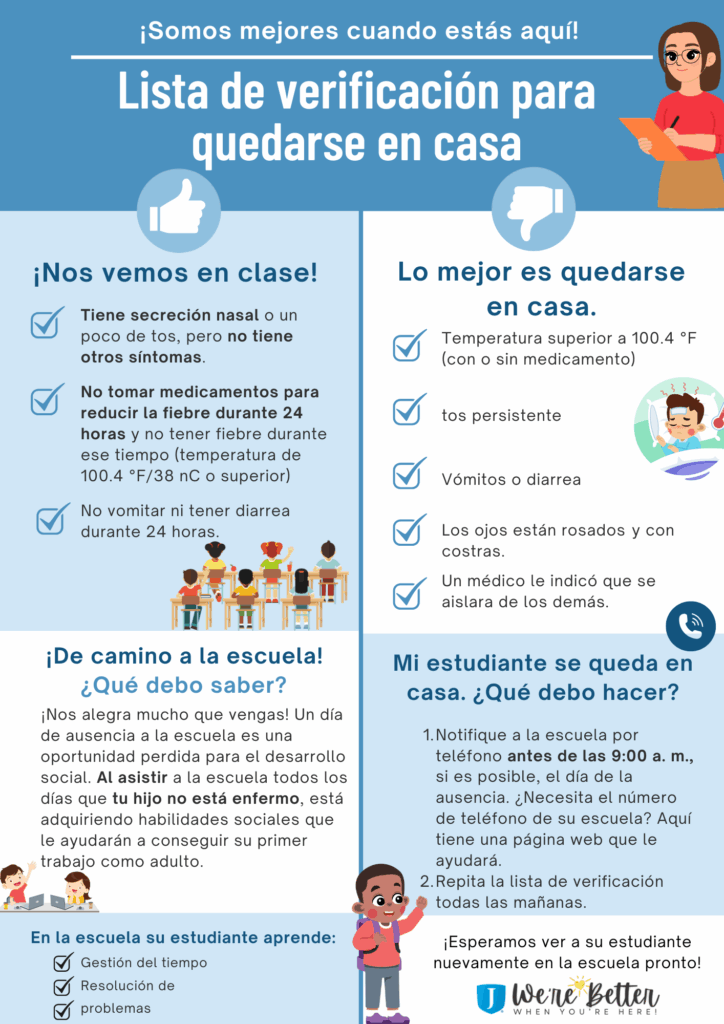
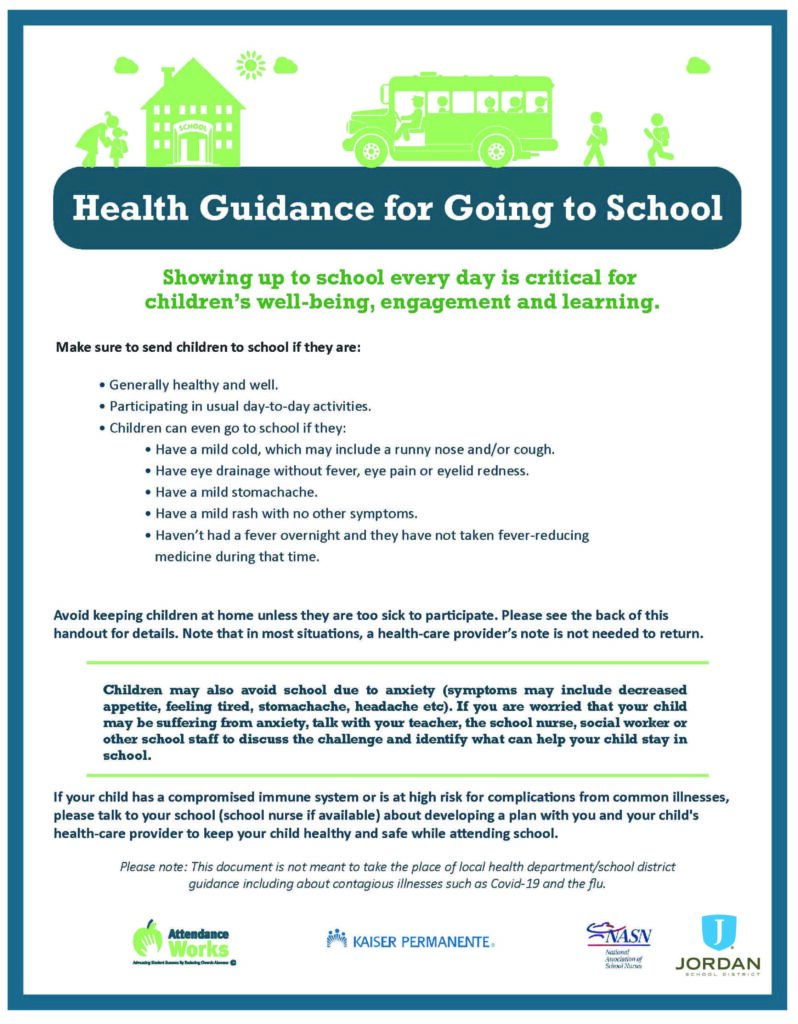
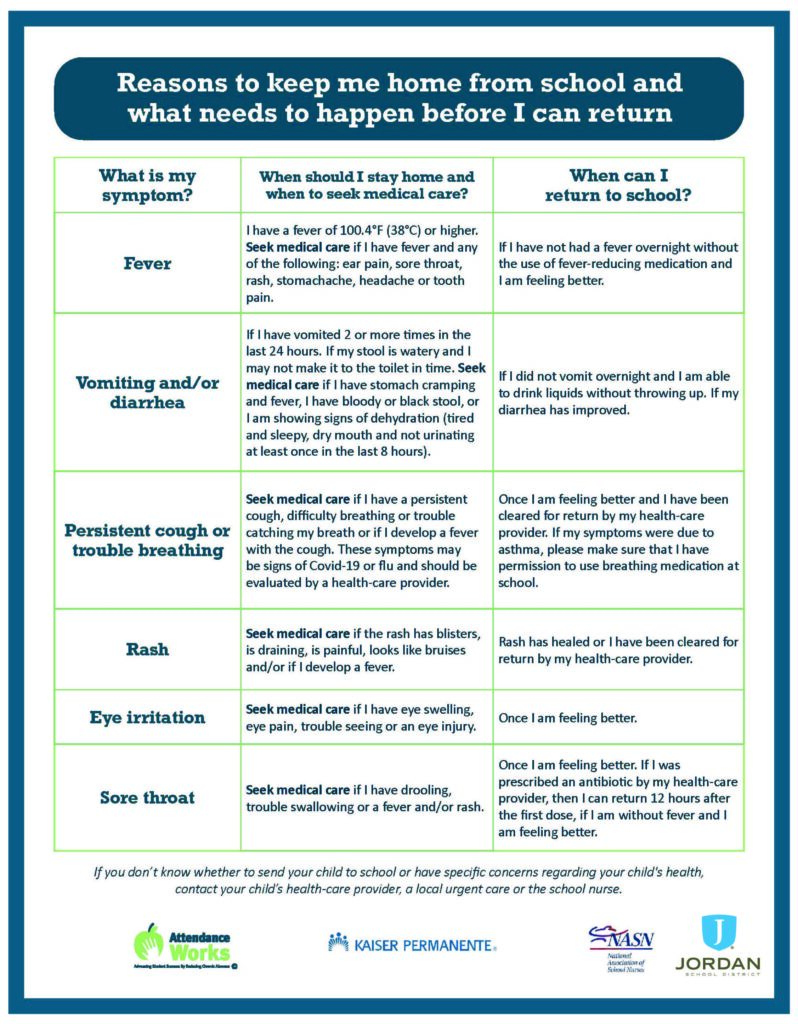
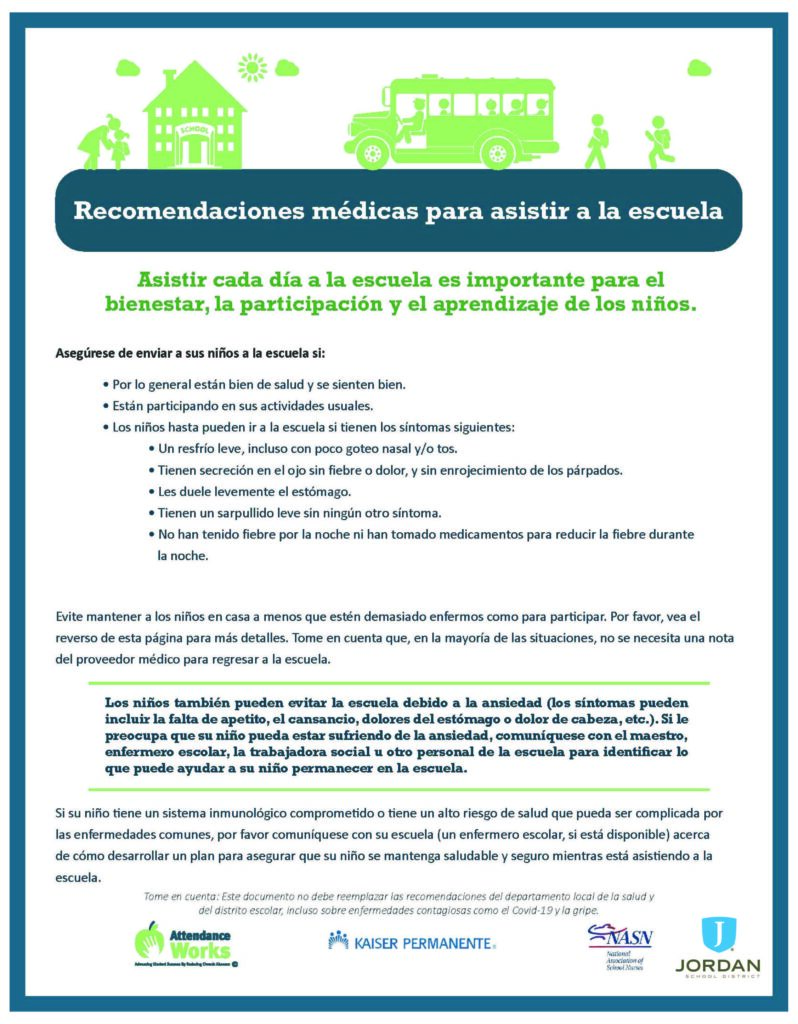
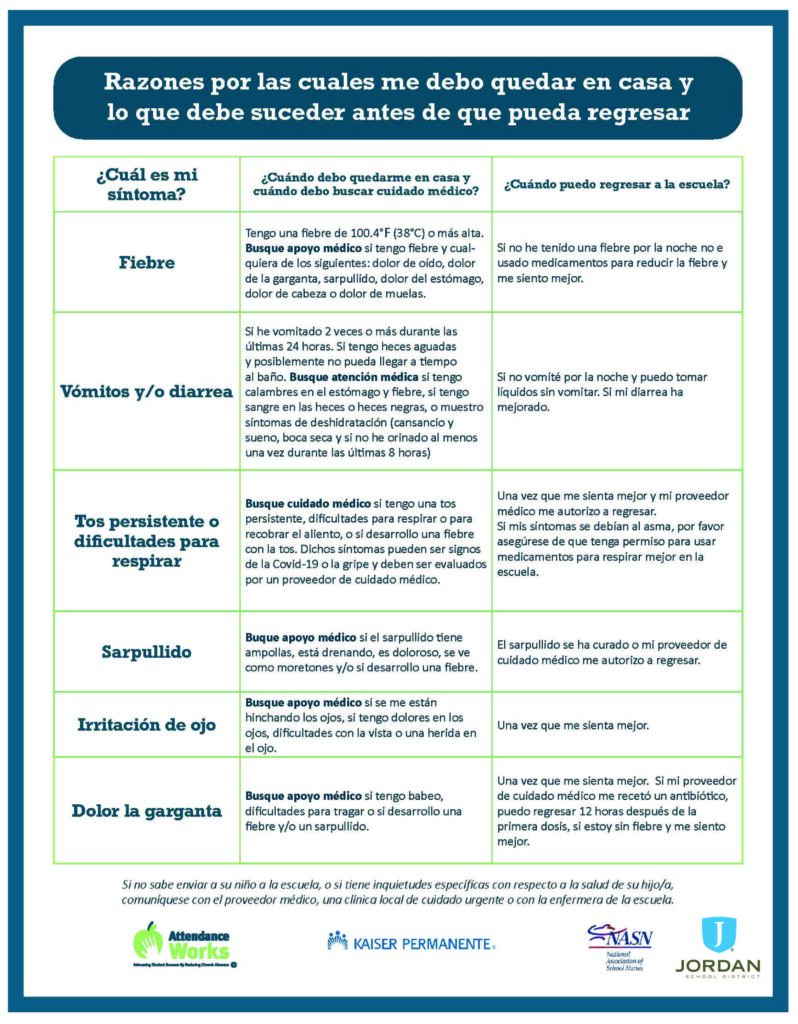
If my child sleeps in or is going to be late, is it better to let them stay home?
Arriving late to school is better than not attending school at all. If your child is having difficulty getting up on time, form bedtime routines, encourage them to get to bed earlier, set an earlier alarm, or multiple alarms, and prepare backpacks, clothes and lunches the night before. If you are experiencing transportation issues, communicate with your child’s school and work together to come up with solutions. Your school is there to help you remove barriers. Don’t hesitate to reach out to the school and see what resources are available to help your child attend and succeed in school.
Family vacation plans not scheduled on a school vacation calendar?
Scheduling time together as a family is important, but school is important too. Families are encouraged to schedule family vacations and travel during scheduled school vacation times in order to avoid too many absences. School is better for everyone when your student is present at school. When students miss days at school, the whole class can be impacted.
My child can get their assignments on CANVAS, is it important for them to go to school?
Benefits from school come not only from completing classroom assignments, but also from interacting with their teachers and peers and participating in extracurricular activities that can boost self esteem and social skills. We highly encourage students to come to school as often as possible. The habit of good attendance will benefit your child now and into their adulthood for a successful future.
How can I make attendance a priority to my child and our family?
Establish the habit of attendance early by setting an expectation of daily attendance. Establish bedtime and morning routines for yourself and your child to get to school on time. Try to avoid non-emergency medical and dental visits during school hours. Schedule extended family vacation when school is not in session. Speak with your child’s teacher about attendance and discuss any concerns you have so the school can help resolve issues you may be facing.
What can I do to help my child remain engaged and interested in school?
Speak with your child/children about their school day, ask what they enjoy at school and brainstorm ideas to make things they don’t particularly enjoy better. Monitor your child’s attendance on Skyward and reach out to the child’s teacher if you have concerns.
The Center for Parent and Teen Communication lists ways parents can get involved with schools. Your involvement with school shows your teen/child you are interested and engaged in their learning process. However, becoming involved impacts more than just academics: “A school-family partnership does more than enhance academic achievement. When parents and teachers work together, students report higher levels of motivation and self-esteem. Students also develop key social and emotional learning skills, such as self-awareness, relationship building, and responsible decision-making.”
Things I do to help my child attend school more often.
There are many things you can do to help your child attend school as often as possible.
- Talk to your child/children about school, what they like about school and ensure they are enrolled in classes, activities, sports, and clubs that are engaging to them.
- Keep track of how many days your child has missed school. Here is a nifty attendance tracking calendar to help you keep track. It is easy to underestimate the amount of absences they have accumulated. Just 2 days a month can cause students to fall behind.
- Stay up to date with immunizations and flu shots to help your child/children stay healthy enough to attend school regularly. Flu and immunization clinics are provided by many schools at back to school nights and around parent teacher conferences.
- Limit time on technology, particularly before bed, to make sure your child is getting adequate rest and sleep to be alert and at school on time.
- Learn if your child feels safe from bullying at school. If your child often complains of stomach aches, headaches, or seems very anxious about school, talk to teachers, counselors, administrators and other parents about how to help your child feel comfortable and excited about going to school.
- Peer pressure can often lead to older students skipping class. Stay on top of your teen’s social contacts and monitor their attendance on Skyward so you are aware of what is happening at school each day. Teens that struggle with making friends often feel isolated and lonely.
- Always ask for help when the need arises. Teachers, administrators, school staff, other parents and community agencies are available to help you reduce any barriers you may be facing. There are agencies available to help families obtain food, housing assistance and address other issues that are making it difficult to attend school regularly.
Infographic: What You Should Know About Good Attendance.
American Academy of Pediatrics (AAP) on Absenteeism and School Attendance
What is the American Academy of Pediatrics (AAP)?
The American Academy of Pediatrics (AAP) is a professional association composed of pediatricians and pediatric medical and surgical subspecialists. The Academy promotes optimal physical, mental, and social health for infants, children, adolescents, and young adults.
American Academy of Pediatrics. (2024, September 6). School Avoidance: Tips for Concerned Parents. healthychildren.org. https://www.healthychildren.org/English/health-issues/conditions/emotional-problems/Pages/School-Avoidance.aspx
Articles:
- School Attendance
- School Attendance, Truancy & Chronic Absenteeism: What Parents Need to Know - HealthyChildren.org.
Resources for Families-
- Nation’s Pediatricians Prescribe Plan to School Attendance
- School Attendance, Truancy & Chronic Absenteeism: What Parents Need to Know
- Back-to-School Tips for Families
- School Avoidance: Tips for Concerned Parents
- When a Teen Wants to Drop Out
- When to Keep Your Child Home from School
- Keep Your Kid Healthy and in School
- Health Guidance for Going to School
What is school avoidance?
School avoidance is when a child/teen consistently resists going to school and can also be referred to as school refusal. The child/teen may outright refuse to attend school, complaining of vague, unexplainable symptoms or coming up with reasons why they should not attend. Many children/teens who resist going to school have anxiety related issues which they don't have conscious control. They may experience headaches, stomachaches, nausea or hyperventilation. These symptoms are usually present on school days and absent on the weekend. When taken to the doctor no physical illness is diagnosed.
American Academy of Pediatrics. (2024, September 6). School Avoidance: Tips for Concerned Parents. healthychildren.org. https://www.healthychildren.org/English/health-issues/conditions/emotional-problems/Pages/School-Avoidance.aspx
5 Things You Can Do if Your Child is Avoiding School:
- Start an Open Conversation: Approach your child with curiosity and empathy. Ask open-ended questions to understand their feelings and concerns about school. For example, “Can you tell me what’s been bothering you about school lately?” or “What part of your school day do you find most challenging?
- Identify Specific Issues: Work with your child to identify specific problems they are facing at school. Ask them to rate different parts of their school day to pinpoint what’s troubling them. This could help uncover issues with peers, teachers, or particular subjects.
- Validate Their Emotions: Acknowledge and validate your child’s feelings without judgment. Use neutral language to describe what you observe, such as “I see you’re really frustrated about going to school.” This helps them feel understood and supported.
- Rule Out Medical Concerns: Ensure that there are no underlying medical issues contributing to their school avoidance. Schedule a check-up with your child’s pediatrician to address potential problems like vision or hearing issues, learning disabilities, or anxiety disorders.
- Model Emotional Expression: Share your own feelings and past experiences to help your child articulate their emotions. For instance, “When I was your age, I sometimes felt nervous about going to school too. How do you feel about it?” This can encourage them to open up and express their own emotions more freely.
School avoidance. Parent Guidance. (2024, August 30). https://parentguidance.org/mhs-topic/school-avoidance/
Articles and Resources about School Avoidance-
School Avoidance Tips from American Academy of Pediatrics-
Parent Guidance-Free resources:
- School Avoidance Alliance: Parents-School Avoidance 101
- School Avoidance - Watch a pre recorded instant insight or a deep dive session and/or register for a live event.
- How to Help Your Child Overcome Fear of School and School Avoidance
- School Refusal: When a Child Won't Go to School
- How to Help Your Child With School Phobia
- When a Teen Wants to Drop Out-American Academy of Pediatrics
Anxiety is natural and normal for people of all ages. It is a mental, physical, and emotional response to perceived threats that each person may experience to varying degrees and to different stimuli. As with all emotions, anxiety can be helpful in small doses – protecting from danger, providing awareness, and motivating to action such as completing homework assignments, not driving recklessly, or staying away from harmful substances. However, when experienced continuously or in extreme amounts, anxiety can cause unpleasant and unwanted mental, physical, and emotional symptoms. These include the following:
- Uncontrollable worry
- Poor concentration
- Heightened nervousness
- Avoidance of something causing fear
- Sleep problems
- Increased heart rate
- Muscle tension
- Upset stomach
When these symptoms (or symptoms like them) are experienced, there is a tendency to avoid the situation that led to feelings of anxiety. Examples of this include skipping classes to avoid another student or giving a presentation, using drugs or alcohol to avoid certain unwanted thoughts or feelings, and procrastinating doing something you don’t want to do but know you need to do. Avoiding anxiety results in an immediate sense of relief, but is temporary, and leads to a return of anxiety with elevated fear. The brain learns that when anxiety goes away, so do the symptoms, thus creating a cycle of anxiety.
For this reason, it is important that individuals find ways to manage and confront their anxiety to stop the cycle. There are many effective treatments for anxiety, including strategies that can be done at home.
Talk to your school counselor, psychologist, or social worker about finding treatment for anxiety or review our mental health provider list.
Fears & Phobias-How Parents Can Help:
-
- Attendance Works:_Anxiety_Handout-English
- Attendance Works:_Anxiety_Handout-Spanish
- Fears & Phobias in Children: How Parents Can Help - HealthyChildren.org
- How to Ease Your Child's Separation Anxiety
- How to Help Your Child With School Phobia
- How to Help Your Child with School Anxiety at Every Age-Parents Magazine
- Help Your Child Manage Anxiety: Tips for Home & School - HealthyChildren.org
- High Level of School Anxiety Instant Insight-4 min answer from a professional therapist
- CDC: Anxiety and Depression in Children
- Child & Adolescent Behavioral Health: Understanding Anxiety in Children
- Child & Adolescent Behavioral Health: Understanding Anxiety in Teens
- Child & Adolescent Behavioral Health: Understanding Depression in Teens
- Need Help Understanding Anxiety? Visit Jordan School District's Health & Wellness site about anxiety.
What Can I Do to Keep My Child Healthy for School?
Tips from Attendance Works for Keeping your Child Healthy and In School:
When Should I Keep My Child Home?
Attendance Works in correlation with the American Academy of Pediatrics has outlined some guidelines for when to keep your child home from school and when its okay to send them to school.
- English & Spanish Versions-
- Attendance-Works-Too-Sick-for-School
Successful Start to a New School Year
- American Academy of Pediatrics (AAP): 5 Ways to Help Your Kids Have a Healthy School Year
- Back-to-School Tips for Families-American Academy of Pediatrics
- Attendance Parent Toolkit-Parent Powered
- Let's Get Ready for School-Elementary Resource
- Insiders Guide to School for Parents & Caregivers
- Get Ready for Great Attendance
- Building Strong Communication with Your Adolescent-Secondary Resource
The Center for Disease Control and Prevention provides many resources for families regarding academics and health. Find those resources here.
Articles/Research About Attendance
- Raise the Bar: Resources for Parents and Families | U.S. Department of Education
- Sample Questions Parents and Families Can Ask to Partner with Your Child’s Teachers and School
Building Strong Relationships with Your Adolescent
If you are experiencing transportation issues talk to your school administration. Work together to come up with a solution to overcome your transportation barriers. They may know of programs that can help for certain circumstances.
Transportation Community Resources
Community Resources through UTA for transportation
Find resources to help you with housing, food insecurity, and other local services through 211utah.org. 211 is Utah's leading resource network connecting families in need with local services. It is a free and confidential resrouce.
Crisis and Family Support Resources
Do You Need Crisis Help For Your Child?
- Juvenile Receiving Center Youth Services - Free crisis counseling, referrals and short-term placement for youth. Open 24/7
- MCOT-Mobile Crisis Outreach Teams (comes to you) call 988
- Family Support Center Nursery (ages 0-11) 801-967-4259
- SafeUT-Stabilization & Mobile Response 1(833)SAFE-FAM (833-723-3326)
- Hopeful Beginnings (with Medicaid)
